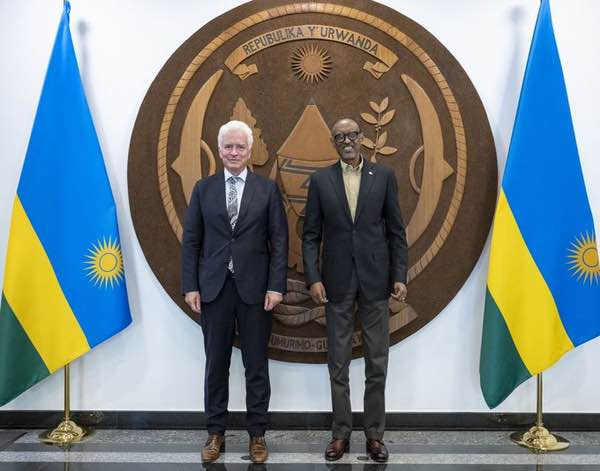
This afternoon at Urugwiro Village, President Kagame received outgoing German Ambassador to Rwanda Dr. Thomas Kurz, who concludes his tour of duty after representing his country in Rwanda for three years and two months. The Ambassador called on President Kagame to bid him farewell.
Germany and Rwanda enjoy close and pragmatic relations, with Germany generally regarded by Rwanda as a partner with no hidden economic or political agenda.
A nostalgic view is often taken of the German colonial era because it now lies in the distant past and is seen to offer a sharp contrast to Belgian colonial rule. The swift assistance provided by Germany following the civil war and genocide of 1994 has not been forgotten and continues to be appreciated by Rwandans.
Bilateral development cooperation focuses on the following three areas: peace and social cohesion; training and sustainable growth for good jobs; and responsibility for our planet – climate and energy.
During the COVID-19 crisis, Germany became a central partner for Rwanda, above all through the work of the Robert Koch Institute (RKI) and the Charité hospital, but also at the multilateral level, for example through the COVAX vaccine initiative. Germany provided support in the form of lab materials.
Cooperation currently focuses on a climate and development partnership and on support for Rwanda’s plans to set up a local pharmaceutical sector, also with the assistance of the Paul-Ehrlich-Institut (PEI). In June 2022, the first sod was turned for a BioNTech investment in vaccine production.
The Goethe-Institut has been represented in Kigali as an independent institute since 2014. In addition to providing support to the education sector, the focus in Rwanda is on cultural projects and offering scholarships. The Friedrich-Ebert-Stiftung has maintained an office in the country since 2018.
At the decentralised level, Land Rhineland-Palatinate has maintained a close partnership with Rwanda since 1982 and has its own coordination office in Kigali. (End)
